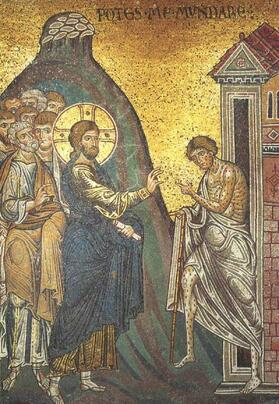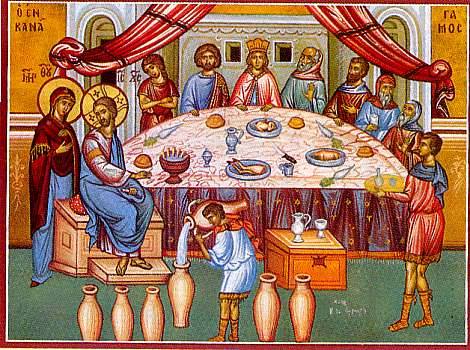2 Kings 5:1-14
Matthew 8:1-13
Pastor James Preus
Trinity Lutheran Church
January 22, 2023
Throughout the Bible, God’s people are engaged in military conflicts with other nations. The land given to them by God is frequently invaded by pagan nations. Scripture is filled with tales of heroes of the faith conquering enemies much greater than themselves by the power of God. Yet, Scripture also records how Israel suffered greatly on account of their unfaithfulness. In our Old Testament lesson from 2 Kings 5, Syria is invading Israel with its army. Yet, the commander of Syria’s army, Naaman, is a leper. He comes to Israel to be healed of his leprosy there by the man of God, Elisha. Yet, he leaves confessing that there is no God in all the earth except the God of Israel. In our Gospel Lesson, Israel is under the control of the Roman Empire. Yet, Jesus conquers the heart of the centurion, the Roman military commander. Without swords or chariots or any weapons at all, God conquers his enemies.
What is the more precious territory to conquer, the dust of Israel or the hearts of men? Indeed, God wins a much greater victory by converting the hearts of the unbelieving nations than He does by killing their soldiers by the thousands. And the greatest enemy of Israel and of every human being is not the armies of hostile nations, but sin, which enslaves the heart and sends people to hell. In our Old Testament and Gospel lessons for today, God does what St. Paul exhorts us to do in Romans 12, “Overcome evil with good!”
The leprosy which inflicted Naaman and the man in Matthew 8 represents the leprosy of sin, which inflicts all mankind. Leprosy was not only painfully unpleasant, but it made you unclean and separated you from God’s people. So does our sin separate us from God. And the mention of the gentiles Naaman and the centurion whom God helps in these passages show us that Christ Jesus has come to rescue all people of all nations from their leprosy of sin, which makes these lessons so perfect for the Epiphany season, which celebrates the revealing of the Gospel to the nations.
When Christ Jesus came to earth, He came to take on the sin of all people. St. John the Baptist called Jesus the Lamb of God, who takes away the sin of the world, not the sin of Israel only, the sin of the whole world. Jesus became the only leper, the only sinner, and died for sins He did not commit, so that people from east and west, from every land would come and sit at the table of salvation with Abraham in whose seed all nations of the earth are blessed. When God cleansed Naaman and healed the centurion’s servant, He demonstrated His intention to save all peoples.
Yet, these lessons teach us more than that God desires to save all people, but how He saves people. God saves people through faith by the ministry of His Word. Jesus died for the sins of all people. Every sin of every person was credited to Jesus when He made perfect satisfaction for them all by His death on the cross, winning forgiveness of sins for all people. Yet, this forgiveness and salvation cannot be received without faith. A person has faith when his heart has been conquered by God’s love and he believes that Jesus is his Savior. Yet, how can a sinner believe that his sins are forgiven unless God speaks this message to him?
And what we learn in theses lessons is that God’s Word is not only powerful to create faith and forgive sins, because it relates a message, but God’s Word has divine power to heal, to save, and even make a person’s heart new! “Is it not a great word the prophet has spoken to you?”, Naaman’s servant asked him. “But only say the word, and my servant will be healed.”, confessed the centurion. God’s Word is all powerful. By His Word, God created the heavens and the earth. God’s Word does not return to Him empty, but accomplishes that which He purposes for it (Isaiah 55:11). So, we learn in these lessons of Holy Scripture the benefits of hearing God’s Word and the power in God’s preaching and Sacraments.
No one can deny the connection between Naaman’s washing and the Sacrament of Baptism. Elisha’s messenger told Naaman to wash seven times in the Jordan River and he would be cleansed. So also, God promises that whoever is washed in the waters of Baptism will be cleansed of all his sins and be given a good conscience, having been clothed in Christ Jesus (Mark 16:16; Galatians 3:27; Acts 2:38; 1 Peter 3:21). At first Naaman was angry and refused to dip himself in the Jordan, arguing that the rivers of Damascus the Abana and the Pharpar were superior to the Jordan. This demonstrates that man’s natural reason chooses free will and his own works over the grace of God. But it wasn’t the Jordan in and of itself that gave it power to heal leprosy, but as Naaman’s servant reminded him, the Word of God from the prophet, which promised that he would wash and be clean. So also, in Baptism we don’t consider the water alone, but the Word of God in and with the water, which promises grace and forgiveness. Those who despise Baptism and doubt that it can forgive sins or save a person are not despising plain water, but the very Word of God.
Elisha sent the gentile Naaman to the Jordan River, where Jesus Himself was baptized and where He first began to baptize. This foreshadows that Jesus would send His disciples out to all nations, making disciples by baptizing them in the name of the Father, and of the Son, and of the Holy Spirit (Matthew 28:19). It is through Baptism that a sinner is joined to God’s family, being adopted by grace. When Naaman rose out of those waters, he not only found himself clean of his leprosy, but he was born again as a child of Israel in his heart, a servant of Israel’s God.
You’ll notice that Elisha, much to Naaman’s displeasure, did not come out to meet Naaman, but sent a servant, who himself sent Naaman to the Jordan. Naaman wanted Elisha to wave his hand over him, perhaps even touch him. Yet, in our Gospel lesson, Jesus does not hesitate to touch the leper and cleanse him of his leprosy. This shows us that all who have been baptized into Christ have been touched with His healing hand. When the water, which has been joined to God’s Word touches the skin of the baptized, we should believe that Jesus Himself is laying His healing hands on the sinner and cleansing him of his leprosy of sin.
This further demonstrates that children too are to be baptized. Jesus commands that all nations should be baptized. Therefore, the burden of proof is on those who would deny Baptism to children. We must not prove that children are included in all nations, but they must find a command in Scripture that forbids Baptism to children. Of course, there is no such command. Furthermore, Jesus said, “Let the little children come to me and do not hinder them, for to such belongs the kingdom of heaven.” And he laid his hands on them, blessing them (Matthew 19:14-15). If Jesus would lay His hands on little children to bless them, He certainly desires that the water of Baptism would touch their skin.
Furthermore, Jesus tells us that unless we become like children, we will never enter the kingdom of heaven (Matthew 18:3). This is reinforced by the fact that it was a little servant girl who first told Naaman’s wife that he could be healed of his leprosy by the prophet in Israel. And again, when Naaman came out of water, his flesh was like that of a little child. These things indicate to us that Baptism is for little children as well that Baptism grants a new birth both to babies and to adults.
And this is the greatest reason why babies should be baptized. Babies are sinners! They are born under the curse of sin, unclean by spiritual leprosy. Babies need to be baptized in order to be saved. Jesus says, “That which is born of flesh is flesh and that which is born of Spirit is spirit.”, when He explains why one must be born again of water and the Spirit in order to enter the kingdom of God (John 3). Your baby may look cute, but cuteness does not save. We are all born sinners. Sinners die and go to hell. Babies must be saved! God promises salvation in Baptism. Baptism joins a sinner to Christ’s death and resurrection, grants the Holy Spirit, forgives sins and causes new birth. This is the promise of Holy Scripture. So, we bring our babies to be baptized with the confidence in God’s promise to save them by it.
Elisha told Naaman to dip seven times in the Jordan River. The number seven carries spiritual significance. It is a perfect number, because God created the world in six day and rested on the seventh. Jesus also taught His disciples that if their brother sinned against them seven times in a day and repented seven times, that they must forgive him (Luke 17:4). Yet, later Jesus proved that this number should not be taken literally when Peter asked how often should he forgive his brother, “up to seven times?”, and Jesus responded, “Not seven times, but seventy times seven.” (Matthew 18:21-22) So, this number seven signifies the bountiful grace of God. When you are Baptized, your sins are not forgiven once, but you receive a daily source of forgiveness your entire life. As often as you repent of your sins, you return to the waters of your Baptism and are made new. This is the great blessing given to you in your Baptism.
This also shows that Baptism does you no good without faith. This does not mean that faith makes Baptism a Baptism. God’s Word makes Baptism a Baptism when it is joined to the water. Just as Jesus’ death on the cross paid for the sins of the whole world whether you believe it or not, so Baptism is a washing of rebirth and source of endless forgiveness of sins by the power of God’s Word alone. Yet, if you do not have faith, neither Jesus’ crucifixion nor your Baptism can save you. It is faith which clings to God’s promise of forgiveness and salvation in Baptism and receives its benefits. But if you do not have faith, then you squander your Baptism.
That is the difference between those who will come from east and west and sit at the feast of salvation with Abraham, Isaac, and Jacob the blessed and those of the kingdom who will be cast out into the outer darkness where there will be weeping and gnashing of teeth. Those who come to sit at the feast of salvation have faith. They have received every promise given in Baptism by believing and trusting in the promise. That is why it is called the priesthood of all believers, not the priesthood of the baptized.
Jesus’ declaration that many shall come from east and west and recline at table with the patriarchs is an invitation and a promise. It is an invitation to all nations to come and join Him in fellowship. We do this by coming to church, hearing the Gospel, and of course eating and drinking Christ’s body and blood for the forgiveness of our sins. And it is a promise that all who do this in faith will indeed join that endless celebration in heaven. This lesson does not pit the Sacraments against faith, but rather demonstrates that the faithful receive God’s grace through faith when they believe the promises attached to Baptism, the Lord’s Supper, and wherever else God attaches His promise. In Baptism and the Lord’s Supper, we see promises to which our faith may hold onto until we finally sit at that heavenly feast. Amen.




 RSS Feed
RSS Feed